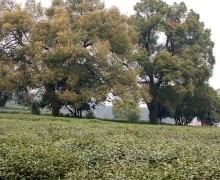Qing Ming In Hangzhou

April 2011. Yesterday was Qing Ming Festival in Hangzhou. The day was cold and rainy but the tea harvest is well underway: it started late but, unlike last year, there wasn’t a false spring that resulted in a damaging cold snap that destroyed the new growth on the bushes. Harvesting is going on across China; everyone is rushing to get as much picked before tomorrow.
Qing Ming is the traditional time for paying respect to one’s ancestors, and a time when Chinese people reunite with their families as much as possible. It is a big day for tea as well, since an offering of tea to one’s ancestors is very important, and of course the first tea of the year is considered the best.
During the time of the Tang Dynasty, the first picked tea was rushed from the tribute tea area, which was a little bit north of Hangzhou and south of Tai Lake, to the old Capital, Xian. If the tea did not make it there by Qing Ming, the Feng Shui for the rest of the year would not be auspicious. It is quite a ride between here and Xian where the old Capital was located. I can imagine the 24 hour ride with horses thundering towards Xian, fighting against the waning day in order to secure the luck of the Empire for a whole year. The consequences for being late were certainly dire.
Hangzhou is full of people that are here to celebrate the Qing Ming holiday, and visit West Lake, the largest municipal park in the world that was first established in the Song Dynasty. Hangzhou has been a cultural center for China since then, and is also the cultural center for tea and silk. Qing Long, the greatest Emperor of the Qing Dynasty, loved Long Jing tea, and reserved his own garden of bushes. They still remain in Long Jing Village. Hangzhou is filled now with an army of tea buyers. The price will fall dramatically after Qing Ming, and the buying frenzy dies down. Ironically the tea will improve and be richer tasting. The local tea drinkers will wait to buy until then.
Austin
